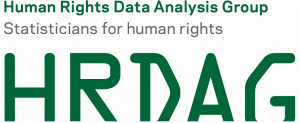Multiple Systems Estimation: Does it Really Work?
<< Previous post, MSE: Stratification and Estimation
Q15. Are there other MSE models one might use with human rights data?
Q16. Is it possible to use MSE to model non-lethal human rights violations?
Q17. I am concerned about using MSE with my data, because the datasets were gathered by opposing organizations. Victims who were reported to an NGO were very unlikely to be reported to state sources, but also very likely to be reported to religious organizations. Won't that cause the overlaps between the NGO list and the state list to be artificially low, and the ...
Multiple Systems Estimation: Stratification and Estimation
<< Previous post, MSE: The Matching Process
Q10. What is stratification?
Q11. [In depth] How do HRDAG analysts approach stratification, and why is it important?
Q12. How does MSE find the total number of violations?
Q13. [In depth] What are the assumptions of two-system MSE (capture-recapture)? Why are they not necessary with three or more systems?
Q14. What statistical model(s) does HRDAG typically use to calculate MSE estimates? (more…)
Multiple Systems Estimation: The Matching Process
<<Previous post: Collection, Cleaning, and Canonicalization of Data
Q8. What do you mean by "overlap," and why are overlaps important?
Q9. [In depth] Why is automated matching so important, and what process do you use to match records?
Q8. What do you mean by "overlap," and why are overlaps important?
MSE estimates the total number of violations by comparing the size of the overlap(s) between lists of human rights violations to the sizes of the lists themselves. By "overlap," we mean the set of incidents, such as deaths, that appear on more than one list of ...
Multiple Systems Estimation: Collection, Cleaning and Canonicalization of Data
<< Previous post: MSE: The Basics
Q3. What are the steps in an MSE analysis?
Q4. What does data collection look like in the human rights context? What kind of data do you collect?
Q5. [In depth] Do you include unnamed or anonymous victims in the matching process?
Q6. What do you mean by "cleaning" and "canonicalization?"
Q7. [In depth] What are some of the challenges of canonicalization? (more…)
Multiple Systems Estimation: The Basics
Multiple systems estimation, or MSE, is a family of techniques for statistical inference. MSE uses the overlaps between several incomplete lists of human rights violations to determine the total number of violations. In this blogpost, and four more to follow, I’ll answer both conceptual and practical questions about this important method. (In posts to follow, questions that refer to specific statistical procedures or debates will be marked, "In depth.") (more…)
How we make sure that nobody is counted twice: A peek into HRDAG's record de-duplication
HRDAG is currently evaluating the quality and completeness of the Kosovo Memory Book of the Humanitarian Law Center (HLC) in Belgrade, Serbia. The objective of the Kosovo Memory Book (KMB) is to commemorate every single person who fell victim to armed conflict in Kosovo from 1998 to 2000, either through death or disappearance.
While building and reviewing their database, one of the things that HLC has to do is “record linkage,” a process also known as “matching.” Matching determines whether two records are the same people (“a match”) or different people ...
Transitional Justice in Syria: Accountability and Reconciliation Conference
I spent last weekend in Istanbul at an excellent conference organized by the Syrian Center for Political and Strategic Studies (SCPSS). The conference included numerous non-governmental organizations (NGOs) from Syria as well as international human rights researchers and advocates. Families of victims told their stories, data collection groups discussed the challenges, and need, to document violations, transitional justice experts worried about infrastructure such as the police force and judicial system, and local leaders pledged to work together for peace.
I was ...
Welcome!
As of today, the Human Rights Data Analysis Group (HRDAG) is an independent* non-profit! It's been a long time coming, and we're delighted to have gotten to this point. HRDAG is a non-profit, non-partisan organization that applies rigorous science to the analysis of human rights violations around the world; for more information, see our About Us page.
Benetech has spun out the scientific and statistical part of the Human Rights Program to HRDAG. The spinout includes (as staff) me -- Patrick Ball -- and Dr Megan Price, as well as our many part-time scientific and field ...
